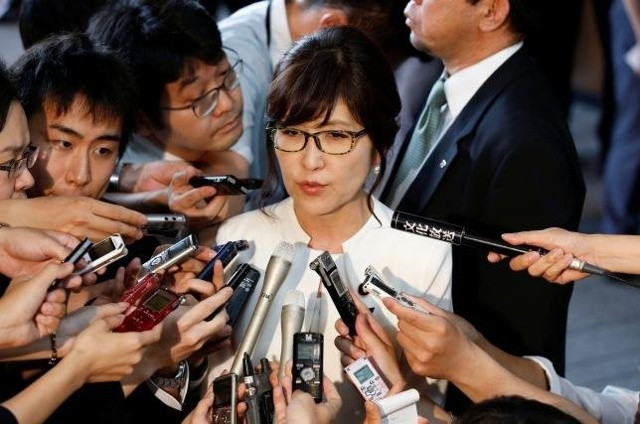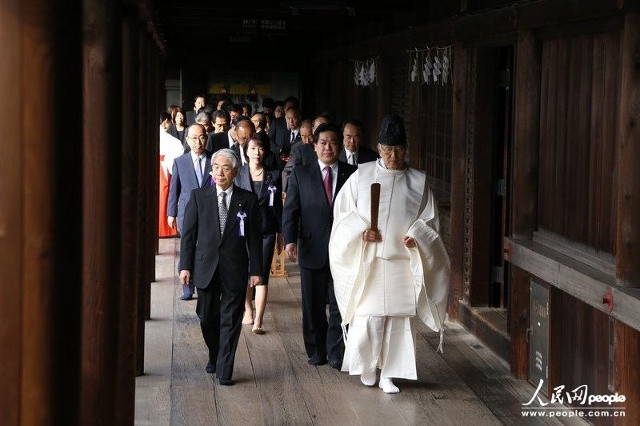New Japanese Defense Minister: A 'thorn' in China's eye?
(Baonghean) - Immediately after Japanese Prime Minister Shinzo Abe chose Ms. Tomomi Inada as Minister of Defense to replace Mr. Gen Nakatani on August 3, China had unpleasant reactions.
Specifically, China Central Television (CCTV) called Ms. Inada a “typical right-wing politician.” So why did CCTV react like that? Could Ms. Tomomi Inada’s rise to power in the military worsen relations between Japan and China?
 |
| Tomomi Inada is interviewed during her inauguration as Defense Minister. |
In a reshuffle of Japan's cabinet on August 3, Prime Minister Shinzo Abe appointed a close ally and hardliner to the position of Defense Minister amid rising tensions in Japan's relations with neighboring countries.
Ms. Tomomi Inada took office as Japan's Minister of Defense amid tensions in Sino-Japanese relations surrounding territorial disputes in the East China Sea and the South China Sea, not to mention the August 3 launch of a ballistic missile by North Korea that landed just 250 km off the coast of Japan.
A lawyer-turned-MP, Ms. Inada, 57, is one of Mr. Abe’s closest politicians and a supporter of Prime Minister Abe’s plan to revise the postwar constitution. She is known for her tough, if not “hawkish,” views on security and defense. According to the Sankei newspaper, at a meeting of the LDP in 2015, Mr. Abe compared Ms. Inada to Joan of Arc, a heroine of France’s war against the English in the 15th century.
Inada replaces Gen Nakatani, who failed in his bid to secure a submarine deal with Australia this year. If successful, the deal would be Japan’s first major foreign defense contract since Prime Minister Abe relaxed arms export rules in 2014.
“Inada’s role will be complicated by her views on Japan’s militaristic past. In addition, China is already wary of Japan because of the South China Sea dispute. China will certainly closely monitor Inada’s statements and Japanese naval activities because of her tough stance,” said Jeff Kingston, director of the Asian Studies Program at Temple University in Japan.
In a statement after taking office, Ms. Inada said she would strive to maintain peace and security based on the US-Japan alliance and cooperation with other countries that share Japan's interests and values. Mr. Bonji Ohara, a researcher at the Tokyo Foundation, said Ms. Yasukuni's appointment as Defense Minister is unlikely to further damage Tokyo's already fragile relationship with Beijing.
 |
| Japanese parliamentarians visit Yasukuni Shrine (October 2013). |
She is one of the people who regularly visits the Yasukuni Shrine in Tokyo - a shrine that China and South Korea see as a symbol of Japan's militaristic past, making Beijing extremely angry. Not only that, what worries them most is that in recent years, Japan under Prime Minister Shinzo Abe has had a major change in defense policy.
Specifically, Japan has revised the interpretation of Article 9 of the Peace Constitution that has existed since World War II. Article 9 of this Constitution stipulates: Japan forever renounces waging war with state power, does not maintain land, sea, air forces and other war forces, and does not recognize the right of the state to wage war.
It can be said that the “Peace Constitution” has significantly limited Japan’s defense development policy. After the amendment, the content of Article 9 of the Peace Constitution has new and breakthrough features such as allowing Japan to fight abroad; loosening and allowing the Japanese military to participate in activities organized by the United Nations abroad for peace and relief...
Thus, after 70 years of loyalty to the defense-only security policy stipulated in the Constitution, Japan has taken historic steps, allowing Japan to exercise the right to collective self-defense or assist the US and allied countries when they are attacked by armed forces.
With her toughness, when leading the Ministry of Defense, Ms. Inada will likely strive to implement the new defense policy, strengthen the authority and role of the Japanese military abroad, realizing the geopolitical ambitions of Mr. Abe and the Japanese government. Because when Ms. Tomomi Inada is a like-minded ally, the change in Shinzo Abe's security policy will certainly be more favorable. This is something that China is extremely worried about, especially in the context of increasingly fierce sovereignty disputes between Japan and neighboring China.
Southern Scenery
(Synthetic)
| RELATED NEWS |
|---|

